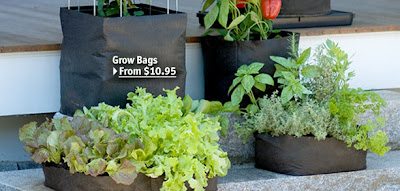Assorted Grow Bags from Gardener Supply
A big part of Beans and Rice's philosophy is to "meet immediate needs while working for long term soultions." From Food Distribution we have learned when given a choice our shoppers definitely want produce. In the fall we surveyed the shoppers and 80% plus said they would be willing to try vegetable gardening if they had some assistence. Laura Tuller our AmeriCorps VISTA for Willow Woods has written a grant to the Community Foundation of the New River Valley to obatin grow bags for a container gardening project. From her proposal: "Grow bags will be used because they are light, portable, durable, and easy to store. We will obtain soil, fertilizer and seedlings from local vendors. The supplies will be distributed to participants with instructions and the option of a mentoring partnership with an experienced gardener. Each participant will receive four containers and a variety of vegetable seedlings according to preferences listed on interest surveys."
Why have we chosen these bags? From the Gardener Supply Catalog(http://www.gardeners.com/ ) "For years now, gardeners in England have made the most of very limited garden space by growing in plastic bags placed on steps, patios, and landings. After achieving terrific results ourselves, we've made two immpovements. First, our Grow Bags are made of patented, double layer polypropylene fabric instead of sheet plastic. This felt-like fabric "breathes" better, so plants won't suffer from heat build-up, over watering or poor aeration." From another site in the catalog: "In our oxygen-permeable Grow Bags, the main root is "air pruned" when it reaches the sides (rather than becoming pot bound). That causes it to absorb masses of nutrient-absorbing lateral roots, making the whole plant healthier and more resistant to disease and drought." In Googling grow bags we found they have been pioneered in areas where people have no access to land and/or the soil is poor. Our folks are apartment dwellers, some lack transportation, and many have physical mobility issues. These light portable bags seem ideal. Further, some users have reported putting the grow bags on rolling plant stands which would allow for movement to follow the sun.
 As you can see from this multi pocket container the gardening can be quite space tight. Also, for someone with limited mobility, they could sit on a stool and handle several plants at once. There are also bags that are specific to types off growing.
As you can see from this multi pocket container the gardening can be quite space tight. Also, for someone with limited mobility, they could sit on a stool and handle several plants at once. There are also bags that are specific to types off growing.
My own experience with container gardening has been spectacular. In Summer 2009 from just four bell pepper plants on my balcony, I obtained enough peppers to freeze 5 gallon bags of chopped peppers. The value of the number of peppers far exceeded the costs of setting the containers up. We also had plenty of tomatoes (in a bad tomato year). My basil harvest was also great.
Starting with 80 bags (4 X 20 families), the cost of the bags alone will run over $1,000.00. In addition we will need soil, fertilizer, and seedlings. From Laura's proposal: "The Food Independence Project is a new initiative for Beans and Rice, Inc. It is being started to address pressing issues of hunger in the city of Radford, while simultaneously working to help families help themselves instead of relying solely on hand-outs or basic social services. It is seen as a step towards the possibility of developing a Beans and Rice, Inc. Community Garden for low to moderate income families in the future. The two major goals for the project are to get twenty families involved in the first year and to generate interest for future gardening seasons.
The project will face several challenges. Because the target population has, for the most part, no gardening experience, an established mentoring program will be critical to ensuring its success. Beans and Rice Inc. plans to use its own staff and the help of the Master Gardeners of the New River Valley. Follow-through by participants is also of concern. By starting with a fairly simple and low maintenance project, we hope to foster success and feelings of accomplishment for our participants so that they are more likely to take the project on independently.



No comments:
Post a Comment